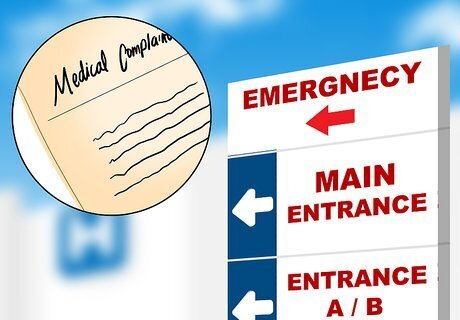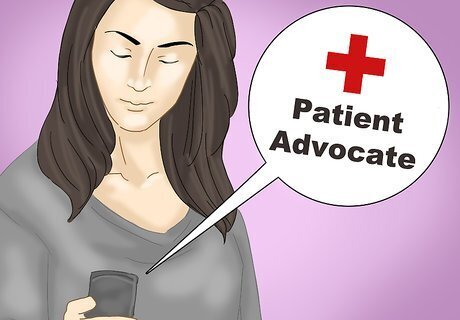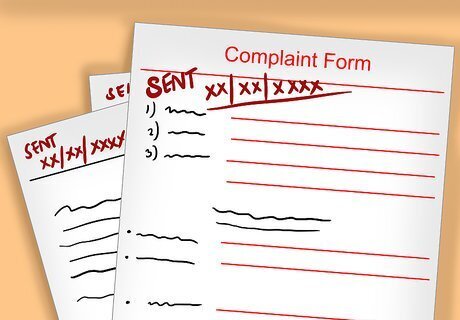
views
Preparing to File a Complaint

Decide on the scope of your complaint. There are many ways in which care may be insufficient and, depending upon what happened, you may want to complain about a specific doctor or an entire hospital. Things to consider include: Was it a single incident involving one individual that led to you receiving inadequate care? Was it a larger systemic problem such as unsafe conditions in a hospital? What needs to occur to correct the problem so that it doesn’t happen to other people?

Determine where you should file your complaint. Many hospitals, medical review boards, states, and government agencies, including Medicare, have formal procedures for filing complaints. You need to complaint to the appropriate authority so that they can conduct an investigation. If you complain to the wrong organization, they won’t be able to address it. First try filing a complaint through the hospital itself. Many will have a specific department that handles grievances and will follow up on your complaint. Search online to see if there is a national or state medical review board that has authority over your health care provider. Many have formal complaint processes which can be conducted online. If you have a government run healthcare plan such as Medicare in the US or a National Health Services plan in the UK, you may be able to complain to them. The websites will guide you through the process for making a complaint. If you do not have a computer, search the phonebook for the numbers of your state’s Department of Public Health. Many have departments that deal with licensing and regulations. If they do not accept complaints, they will be able to direct you where to go next.

Consider what you want the outcome to be. Generally the medical board or organization will conduct an investigation and notify you of the outcome. If you have thoughts about what you feel would be appropriate, make your opinions known in your complaint. The review board will do what they feel is necessary to protect the public’s health and safety, but, depending upon the severity of the incident, they may take your thoughts into consideration. Several outcomes are possible, including the following serious consequences: Formally reprimanding the healthcare provider Suspending a license Placing conditions on a license Revoking a license

Keep your expectations realistic. This means understanding what the authority will not do. Read the instructions on the websites of the medical review organization carefully to make sure that the outcome you want is possible to achieve through a complaint to them. If you are complaining about rudeness or an unprofessional manner, that may not be within the scope of a state or national review board. Such complaints might be more effectively addressed to the hospital or health care provider directly. If you are seeking monetary compensation for damages, you will likely need to file a lawsuit in addition to a medical complaint. This would need to go before a court. Make sure you research your lawyer and choose reputable representation.

Contact a patient advocate if you are overwhelmed. Healthcare services can be extremely bureaucratic and difficult to navigate. A patient advocate may be able to guide you or even file the complaint on your behalf. Many hospitals have patient advocates on staff. If you talk to a patient advocate who is employed by the hospital about which you would like to complain, ask them whether their assistance will be confidential. Search in the phonebook or online for patient advocate organizations, such as The Empowered Patient Coalition in the US or Healthwatch in England. These organizations should be able to help you find resources that are near you or relevant to your situation.

Hire an attorney. If your issue concerns medical bills or you believe you were taken advantage of, you may want to speak with an attorney. The attorney can give you legal advice on what is permissible by law and help you seek damages if necessary. Common reasons for needing an attorney include: Denial of benefits and requests for assistance with the appeals process Fraudulent billing or unreasonably high charges Unnecessary medical procedures

Review your insurance. Specific insurance plans can be hard to understand. Before filing a complaint in regards to billing, ensure that your insurance was filed correctly with correct diagnosis code. Ensure that coverage is reviewed to make certain that deductibles have been met and the service was a covered benefit.
Filing the Complaint

Use the appropriate forms. This will help the authority you are filing with quickly and accurately assess the incident. It will also help to make sure you provide all the information they need. Make sure you fill out the entire form correctly and that you include any necessary information. This will streamline process, ensuring timely response. Search the websites to determine whether there is a form that you can fill out and submit entirely online. If so, this will be the quickest and easiest way to do it. There may also be a downloadable form that you can print and mail. If you do not have access to a computer, you can either call the organization and ask them to mail you any forms you need, or you can use a computer at a public library.

Provide evidence. When you fill out the complaint, be as specific as you can. This will help the organization to do a thorough, rapid investigation. If you have supporting documentation such as medical records or second opinions from other doctors, include copies of these reports — never send the originals. It is particularly important to provide: Names of the individuals and organizations involved. A clear concise description of the events that occurred. State the facts only, without inserting any opinions. A timeline that is as accurate as possible. Provide dates and times.

Keep records of everything. Keep copies of all complaints, notes, and supporting evidence you provide. This is important in case you are asked for additional information later to verify the details. It is also crucial that you have copies in case the documentation you send gets lost. Keep a record of when you sent everything. Many online systems provide you with a confirmation number. Save the notification with the confirmation and date. If you send materials by mail, consider sending it with a tracking number so you can confirm that it was received. Keep records, including names, dates, and times, of all people you communicate with throughout the investigation.

Ask the organization how they will contact you. Many organizations have formal procedures and timelines for notifying people about the status of their complaints. Things to ask include: Will you receive regular updates on the status of the investigation? If so, how often? Will you be notified of the outcome of the investigation? If so, how? Will the organization contact you by mail or email? Can you check online to see the status of your complaint?




















Comments
0 comment